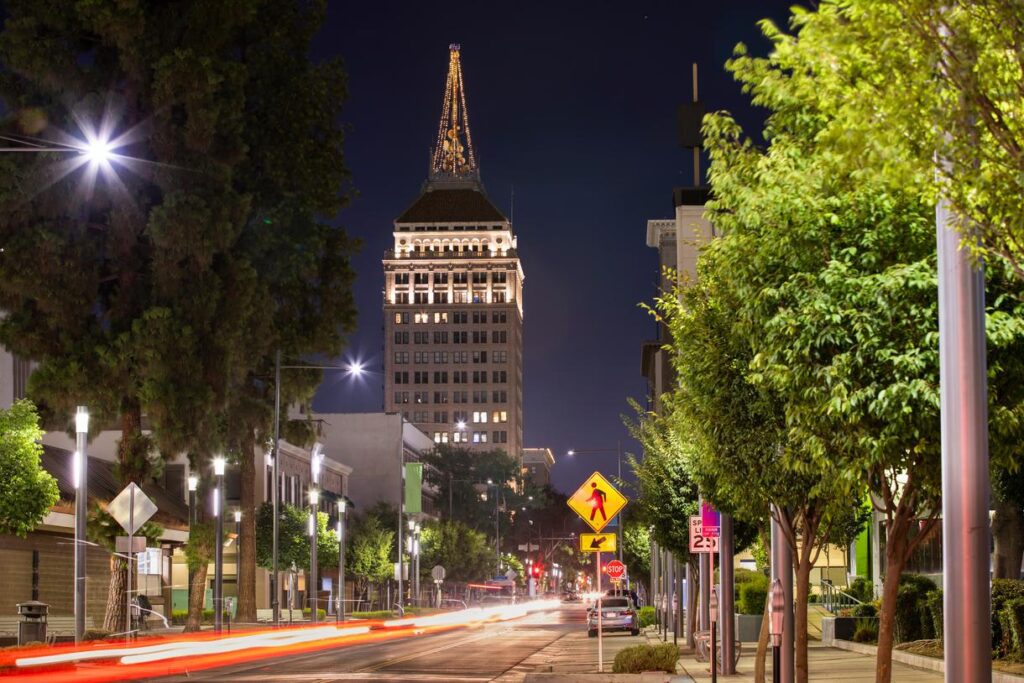The History of Fresno CA

Nestled in the heart of California’s Central Valley lies Fresno, a city whose history is as diverse and vibrant as its present. From its humble beginnings as a stopover for travelers to its evolution into a bustling metropolis, Fresno’s story is a testament to resilience, growth, and the pioneering spirit of its inhabitants.
The Early Days
Fresno’s history dates back to the 1850s when the area was primarily inhabited by Native American tribes such as the Yokuts and Mono peoples. Spanish explorers traversed the region in search of new lands, leaving behind a legacy that would shape Fresno’s cultural landscape.
In 1872, the Central Pacific Railroad laid tracks through the area, marking the beginning of Fresno’s transformation into a vital transportation hub. The establishment of a railroad station led to the rapid influx of settlers and businesses, spurring economic growth and development.
Agricultural Roots
Fresno’s fertile soil and temperate climate soon made it an ideal location for agriculture. The arrival of irrigation systems fueled the expansion of farms and orchards, with crops such as grapes, figs, and citrus fruits becoming staples of the local economy.
The late 19th and early 20th centuries saw the rise of large-scale agricultural operations, with Fresno emerging as a leading producer of raisins and tree fruits. The establishment of the Fresno Irrigation District in 1920 further bolstered the region’s agricultural prowess, ensuring a reliable water supply for farmers.
Cultural Melting Pot
As Fresno flourished, it attracted people from all walks of life, creating a diverse tapestry of cultures and communities. Immigrants from Europe, Asia, and Latin America flocked to the city in search of opportunity, bringing with them their traditions, cuisines, and languages.
Fresno’s rich cultural heritage is evident in its neighborhoods, where vibrant ethnic enclaves thrive. From the historic Chinatown district to the vibrant Armenian community, each group has left an indelible mark on the city’s identity.
Challenges and Triumphs
Despite its many successes, Fresno has faced its share of challenges over the years. The Great Depression dealt a severe blow to the local economy, leading to widespread unemployment and hardship. However, the resilience of Fresno’s residents saw them through the tough times, with community spirit and innovation driving recovery efforts.
In the mid-20th century, Fresno, CA experienced rapid urbanization and suburbanization, as the population surged and new developments transformed the cityscape. While this period of growth brought prosperity, it also brought with it social and environmental challenges, including air pollution and urban sprawl.
Modern-Day Fresno
Today, Fresno stands as a dynamic metropolis, blending its agricultural heritage with modern innovation and technology. The city’s economy remains deeply rooted in agriculture, with agribusiness continuing to drive growth and employment.
At the same time, Fresno has diversified its economy, attracting investment in sectors such as healthcare, education, and manufacturing. The presence of institutions like California State University, Fresno and Community Medical Centers has cemented the city’s reputation as a regional center for education and healthcare.
Fresno’s cultural scene is thriving, with a vibrant arts community, diverse culinary offerings, and a calendar packed with festivals and events. The city’s downtown area has undergone a renaissance in recent years, with revitalization efforts breathing new life into historic buildings and public spaces.
Looking to the Future
As Fresno looks to the future, it faces a new set of challenges and opportunities. Issues such as water scarcity, affordable housing, and economic inequality will require innovative solutions and collaboration among residents, businesses, and government agencies.
However, if history is any indication, Fresno is more than up to the task. From its humble beginnings as a small railroad stop to its current status as a thriving urban center, Fresno’s journey is a testament to the resilience, ingenuity, and spirit of its people.
In conclusion, the history of Fresno, CA, is a tale of perseverance, growth, and diversity. From its agricultural roots to its modern-day dynamism, Fresno has evolved into a vibrant and resilient city that continues to shape the cultural and economic landscape of California’s Central Valley. As Fresno looks ahead to the future, it does so with optimism and determination, ready to embrace the challenges and opportunities that lie ahead.
FAQs
Fresno's name has Spanish origins, derived from the Spanish word for "ash tree." The city was named after the abundant ash trees that once lined the banks of the San Joaquin River.
Fresno was officially founded in 1872 as a railway station of the Central Pacific Railroad. The city's strategic location as a transportation hub contributed to its rapid growth and development.
Fresno's economy has historically been based on agriculture, with the region known for its production of crops such as grapes, figs, citrus fruits, and tree nuts. In recent years, the city has diversified its economy, with sectors such as healthcare, education, and manufacturing playing an increasingly significant role.
Fresno is home to several notable landmarks, including the historic Tower Theatre, which has been a centerpiece of the city's cultural scene since the 1930s. Other landmarks include the Forestiere Underground Gardens, a unique network of underground tunnels and courtyards, and the Fresno Chaffee Zoo, which houses a diverse collection of animal species.
Fresno's cultural landscape is rich and diverse, shaped by the contributions of various ethnic communities. The city's historic Chinatown district reflects its early Chinese immigrant population, while the vibrant Armenian community has left a significant imprint on Fresno's culinary scene and cultural traditions. Additionally, Fresno's proximity to Mexico has influenced its vibrant Hispanic culture, evident in its festivals, music, and cuisine.

